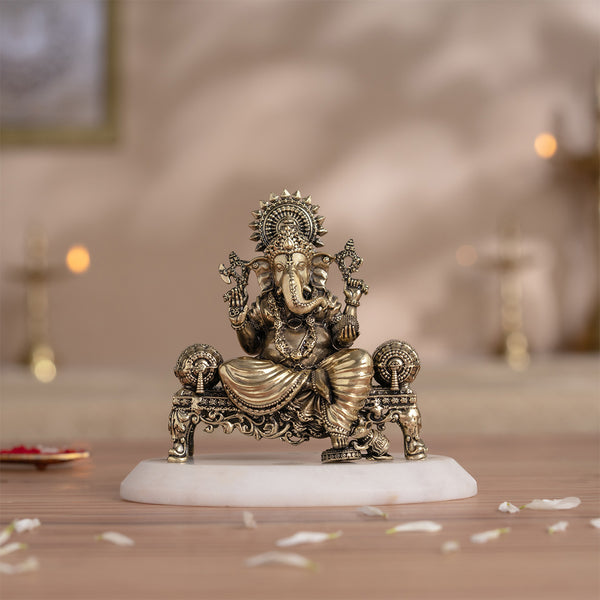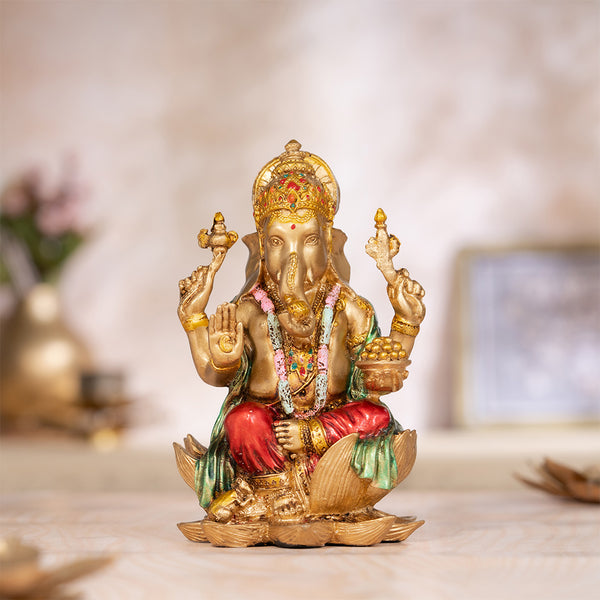Lord Ganesha holds the place of being the first and foremost deity who is worshipped at the beginning of every occasion.
Considered as one of the glorious and auspicious presences in the Hindu culture, Lord Ganesha’s blessings are sought with a variety of offerings that this charming God loves.
However, tulsi or basil leaves are conspicuously absent in those offerings. This is curious, considering the holiness and importance that we assign to the tulsi plants in our religion.
Tulsi, or holy basil, is one of the most sacred plants in Hinduism. It is often used in pujas and religious ceremonies, and is believed to have many purifying and healing properties.
However, there is one god to whom tulsi is never offered : Lord Ganesha.
According to a 2019 survey, 90% of Hindus in India do not offer tulsi to Ganesha. This practice is so widespread that it is even mentioned in the Shiv Purana, one of the most important texts of Hinduism.
In this article, we delve into the origins and reasons behind this tradition.
The Significance of Tulsi in Hinduism
The Tulsi plant, scientifically known as Ocimum tenuiflorum but cherished as holy basil, holds a special place in Hinduism.
It's seen as more than just a plant; it's considered a manifestation of the goddess Lakshmi, Lord Vishnu's companion.
People hold the tulsi plant in high reverence and worship it with great respect.

Tulsi is believed to possess cleansing powers, capable of dispelling negativity and fostering spiritual development.
Its leaves are integral to ceremonies and rituals, and they're even consumed as tea or food for their medicinal benefits.
The tales surrounding Tulsi's origin are diverse, but one touching story portrays her as a princess transformed into a basil plant due to a sage's curse.
However, Lord Vishnu recognized her unwavering devotion and made her his companion.
Frequently grown in the courtyards of Hindu households, the Tulsi plant is thought to safeguard the home against malevolent forces and attract good fortune. Its significance extends to matters of marriage and fertility.
Tulsi's sacredness has endured across generations in Hindu culture. It symbolizes purity, affection, and the profound bond of devotion.
Brass Ganesh Idol Virajman On Sinhasan (4 Inch) Dagdusheth Ganpati Murti With Chowki For Home - Gold Plated (7 Inch)

The Significance of Lord Ganesha in Hinduism
This modak-loving God, Lord Ganesha is a popular and beloved deity in Hinduism. He is a symbol of wisdom, knowledge, success, and a vanquisher of obstacles.
In the realm of Hindu deities, Lord Ganesha stands tall. He's the friendly and charming elephant-headed God who sweeps away troubles and showers wisdom, understanding, and accomplishment.
With a charming potbelly and a mouse as his ride, he's quite the distinctive figure.

Born to Lord Shiva and Goddess Parvati, Lord Ganesha takes the limelight. He's the one folks turn to before starting any task, trusting his knack for removing roadblocks and ensuring victory.
Students and business folks are particularly keen on his blessings, believing he's the source of both smarts and prosperity.
Think of him as the divine cheerleader for any endeavor. His wisdom is often portrayed with him clutching a book or rosary.
What's more, he's also the go-to deity for folks in the arts and crafts scene, with his little mouse buddy tagging along, a symbol of his imaginative prowess.
Examining the Ancient Belief Behind the Practice
The story behind this tradition has a mix of myths and historical tales.
One of them spins the tale of Tulsi, once a princess, cursed into becoming a basil plant by a sage. But her devotion moved Lord Vishnu, who made her his partner.
Another myth has Lord Ganesha and Tulsi falling in love. However, Tulsi's father wasn't onboard and cursed Ganesha against marrying.
The texts also weigh in. The Padma Purana claims Tulsi is Lakshmi, Vishnu's partner, making it impolite to offer her to another god.
The religious and cultural explanations for this tradition are also complex. Some believe that Tulsi is too pure and sacred to be offered to any god other than Lord Vishnu.
Others believe that the two gods are rivals, and that offering Tulsi to Lord Ganesha would anger Lord Vishnu.

In a nutshell, the reasons for not sharing Tulsi with Ganesha are varied. But this tradition digs into Hindu myths and culture.
The Padma Purana also says Tulsi is Shakti, divine femininity, unfit for male gods. Some think the "no Tulsi for Ganesha" rule came later. They reckon both gods were once buddies, not rivals.
Regardless, Hindus today largely stick to not offering Tulsi to Ganesha. It's a nod to Tulsi's sanctity and a lesson in godly respect.
Modern Perspectives and Analysis
Today, many Hindus still follow the tradition of not offering Tulsi to Lord Ganesha. But when it comes to this practice, modern viewpoints come in all shapes and colors.
Some Hindus believe that the practice is still relevant today because it is based on ancient religious beliefs.
They argue that the gods should be respected and that offering Tulsi to Ganesha would be disrespectful to Vishnu.
Others think otherwise. They argue this old tale isn't as believable today, and the practice seems unfair. Why should Tulsi be treated differently from other plants?
Scholars have their say too. Some say it's about preserving Tulsi's sacredness—reserving it solely for Vishnu.
Others see it as a historical way of keeping women under control, the curse story as a metaphor for suppressing women's freedom.
In the midst of all this, there's no one-size-fits-all answer. Some feel this practice should retire, not fitting modern values. They see it as unfair and out of touch with today's Hinduism.
On the flip side, some stand strong for tradition. They believe it honours ancient customs and reminds us to show reverence for both Tulsi and the gods.
Ganesha Vighnaharta Antique Idol (7 inch)
Conclusion
In a world marked by rapid change, some things stand the test of time.
The practice of not offering Tulsi to Lord Ganesha, rooted in ancient Hindu beliefs, serves as a window into our past and a touchstone for understanding the intricate tapestry of tradition.
As we ponder this practice, we glimpse the rich layers of thought that have shaped Hindu customs. It's a reminder that old tales still whisper in our ears, influencing our actions today.
By delving into the rationale behind such practices, we uncover more than just rituals; we uncover the essence of reverence and the dynamics of faith.
In this age of evolving values, it's crucial to explore the origins of these traditions.
It's a journey that bridges the past and present, and teaches us that beneath these practices lie stories of devotion, respect, and even reflections of societal norms.
Also Read : Decoration For Ganesh Chaturthi 2025







